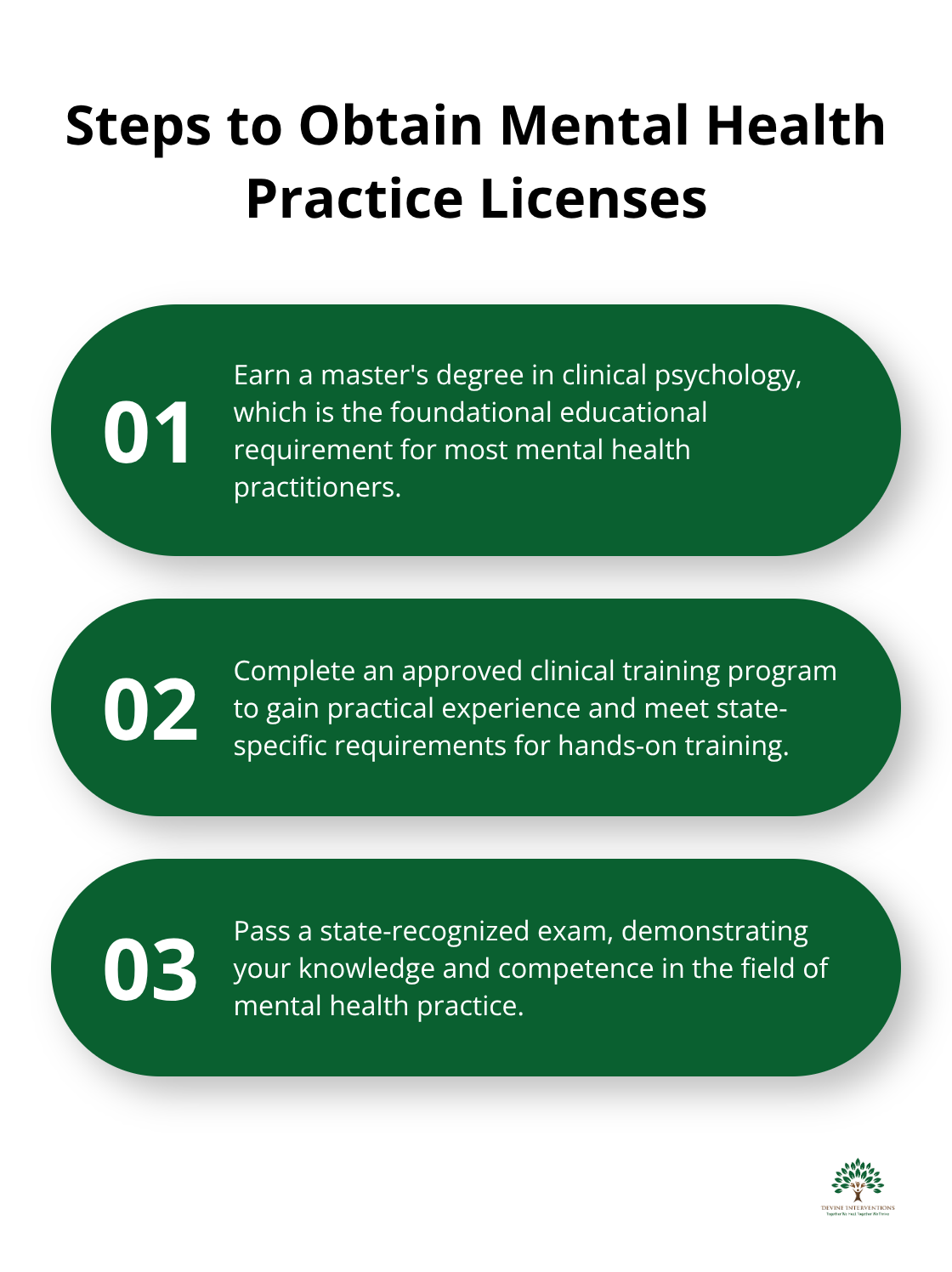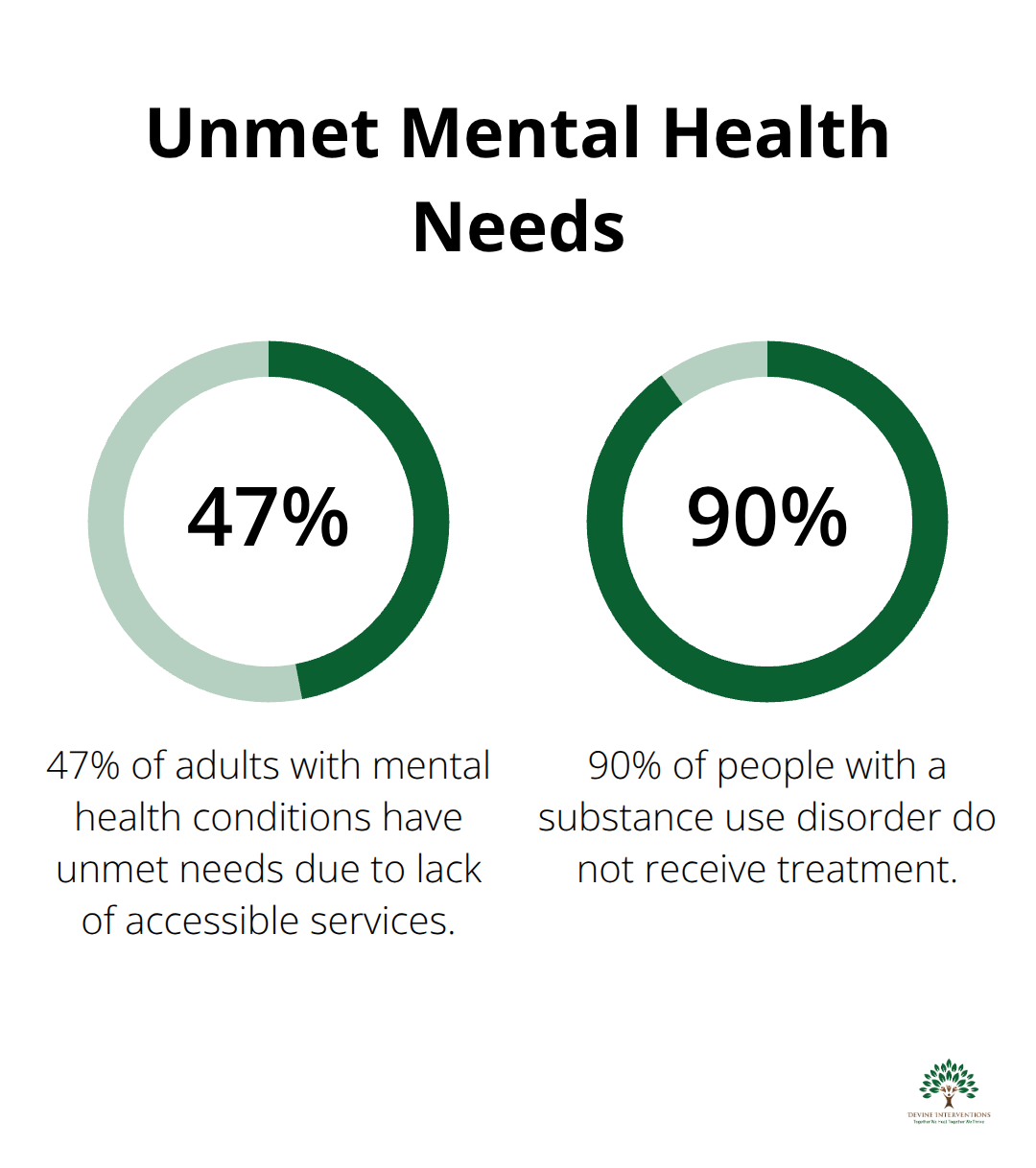Starting a mental wellness business can be both rewarding and challenging. At Devine Interventions, we’ve seen firsthand the impact that dedicated entrepreneurs can have on their communities’ mental health.
This guide will walk you through the essential steps to launch your own successful mental wellness venture, from market research to service development. We’ll explore various mental wellness business ideas to help you find your niche and make a lasting difference in people’s lives.
How to Research Your Mental Wellness Market
Identify Your Mental Wellness Niche
The mental wellness market is expected to reach $261.43 billion by 2029, growing at a rate of 8.8%. To stand out, focus on a specific area where you can excel. This could be anxiety management, substance abuse treatment, or trauma therapy. Examine local demographics and health trends to spot gaps in services. For instance, if your area has a high population of veterans, PTSD treatment might be in demand.

Analyze Your Competition
Study both local and online mental health providers. Visit their websites, read reviews, and (if possible) attend their public events. This will provide insights into their strengths and weaknesses. Take note of their pricing, service offerings, and unique selling points. The goal isn’t to copy but to find ways to differentiate your services.
Create a Solid Business Plan
Your business plan serves as your roadmap to success. Include detailed financial projections, marketing strategies, and operational procedures. Be realistic about startup costs and potential revenue. Therapy costs can vary significantly by state and region, with average fees per session ranging from $122 to $227 in 2023-2024.
Define Your Target Audience
Knowing who you’ll serve is essential. Will you focus on adolescents, working professionals, or seniors? Each group has unique needs and preferences. For example, if you target busy professionals, consider offering flexible scheduling or telehealth options. Understanding your audience will shape everything from your marketing approach to the design of your office space.
Stay Informed About Industry Trends
The mental health landscape constantly evolves. Keep up with new treatment modalities and industry developments. This knowledge will help you adapt your business model as needed, ensuring long-term success in the rewarding field of mental wellness.
Now that you’ve researched your market thoroughly, it’s time to move on to the next critical step: setting up the legal and operational aspects of your mental wellness business.
Setting Up Your Mental Wellness Business
Choose Your Business Structure
Your business structure impacts taxes and personal liability. Most mental health practices select either a Limited Liability Company (LLC) or Professional Limited Liability Company (PLLC). These structures protect personal assets while offering management flexibility.
A 2023 survey by the American Psychological Association found that 48% of new therapy practices opted for the LLC structure. This choice often strikes a balance between legal protection and operational simplicity.
Obtain Licenses and Certifications
Proper licensing is mandatory. While requirements vary by state, they typically include:
- A master’s degree in clinical psychology
- Completion of an approved clinical training program
- Passing a state-recognized exam
The National Board for Certified Counselors reports an average of 2.5 years from graduation to full licensure. Start this process early to ensure compliance.

Secure Insurance Coverage
Professional liability insurance (malpractice insurance) is essential. Some policies offer coverage up to $25,000 per claim / $100,000 aggregate for medical expenses incurred by others as a result of a covered incident.
Don’t neglect general liability and property insurance. These policies protect against common business risks (such as client injuries on your premises).
Establish Financial Systems
Strong financial systems underpin success. Invest in practice management software that combines scheduling, billing, and electronic health records. Options like SimplePractice or TherapyNotes can streamline your operations.
Open a separate business bank account and credit card. This separation is vital for tax purposes and personal liability protection.
Work with an accountant who understands mental health practices. They can guide you through complex issues (like Medicare billing or setting up a chart of accounts).
A solid foundation sets the stage for your mental wellness business to thrive. The next step is to build your service offerings, which we’ll explore in the following section.
How to Build Effective Mental Wellness Services
At the heart of any successful mental wellness business lies a suite of well-designed services. We at Devine Interventions know that crafting these offerings requires a blend of clinical expertise, market awareness, and client-centered thinking.
Tailor Your Service Menu
Start by assessing your community’s needs. A 2023 survey by the National Alliance on Mental Illness found that 47% of adults with mental health conditions left their needs unmet due to lack of accessible services. This gap presents an opportunity for new providers to step in with targeted solutions.
Try to offer a mix of individual therapy, group sessions, and specialized programs. For example, if your area has a high rate of substance abuse, develop a robust addiction recovery program to fill a critical need. The Substance Abuse and Mental Health Services Administration reports that only 1 in 10 people with a substance use disorder receive treatment, indicating a significant market opportunity.

Implement Evidence-Based Protocols
Base your treatment methodologies on proven clinical practices. The American Psychological Association emphasizes the importance of evidence-based treatments, which improve outcomes by up to 75% compared to non-evidence-based approaches.
Incorporate modalities like Cognitive Behavioral Therapy (CBT), Dialectical Behavior Therapy (DBT), or Eye Movement Desensitization and Reprocessing (EMDR) into your practice. These therapies have strong empirical support and adapt to various mental health conditions.
Price Strategically for Sustainability
Price your services to balance accessibility with business sustainability. The National Council for Mental Wellbeing suggests that the average cost for outpatient mental health services ranges from $100 to $200 per session. However, your specific pricing should reflect your local market, overhead costs, and target clientele.
Consider offering a sliding scale for a portion of your clients to increase accessibility. This approach can help you serve a broader community while maintaining financial stability. Some practices find success by reserving 20-30% of their slots for reduced-fee clients.
Forge Healthcare Partnerships
Establish strong relationships with other healthcare providers to boost your practice’s reach and effectiveness. The Collaborative Care Model has shown to improve patient outcomes in behavioral healthcare.
Reach out to primary care physicians, hospitals, and community health centers in your area. Propose collaborative care arrangements where you provide specialized mental health services to their patients. This expands your client base and ensures more comprehensive care for individuals in your community.
Final Thoughts
Starting a mental wellness business requires dedication, planning, and a genuine desire to make a positive impact. The mental health landscape constantly evolves, so professionals must stay informed about new treatments, technologies, and client needs. Continuous learning and adaptation will prove essential for long-term success in this dynamic field.
Mental wellness business ideas offer vast opportunities, from specialized therapy services to innovative digital solutions. You can leverage your unique skills and experiences to create a standout business that addresses unmet needs in your community. Organizations like Devine Interventions support mental health professionals and entrepreneurs in their journey.
The mental health field needs passionate, dedicated professionals now more than ever. You have the power to change lives and contribute to a healthier, happier society. Take the first step today – your future clients await your expertise and care.







